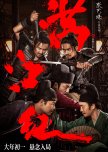
Today is a good day to die.
Xu Tian, the young scion of a wealthy Southeast Asian family, is on his way to Shanghai to meet his fiancee for the first time. Set in 1930, his journey takes him from Guangdong through Jiangxi and Zhejiang; lawless territory controlled by local warlords. This is a road drama where the journey is an analogy for Xu Tian's personal growth and how this perilous trip makes a man of him. He is aided and inspired by five eccentric jianghu characters - a hot-blooded revolutionary, an idealistic warlord in a gilded cage, a romantic gambler, a passive aggressive doctor and a bourgeois wheeler and dealer. As they cut a bloody path to Shanghai, Xu Tian learns that actions have consequences; to live in the moment; that luck can change; that family must be protected and that money can buy access to all sorts of people and things.This is the fist time I have seen a Chinese drama attempt this kind of bizarre, absurd and violent black comedy where a small event, in this case a purloined wallet spirals out of control and snowballs into a series of violent, unpredictible and bloody encounters. All of Xu Tian's companions along the way have distinctive personalities and temperaments that make them the main character in their own stories. They are wierd, flawed, obssessive characters that are at surface triggered by bizzare and seemingly trivial events that are actually profound and hopelessly romantic upon deeper reflection. When triggered, they become raging bloodthirsty lunatics with a "today is a good day to die" kind of reckless fearlessness and determination. The ethos and irony is captured and diffused by the crisp, darkly comedic dialogue that builds both anticipation and fear as the story careens down a volatile and unpredictible path.
This cast list is like the who's who of top Chinese actors, starting with Liao Fan as Lao Sun. His opening arc is the one that made me experience shock, awe, rage and sorrow at man's reckless, absurd, obstinacy and obsessiveness. This was a tough act to follow and Zhang Luyi fumbles a bit in his portrayal of Yu Yixiu, who is by design a fascinating paradoxically powerful and helpless character. Thus the second arc sags somewhat but gets shored up somewhat by Wu Xiaoliang's short and moving portrayal of the lovestruck gambling addict. The drama gallops on to a thrilling finish when Zhang Yi's obsequious, passive aggresive doctor teams up with Tian Yu's explosive, trigger happy capitalist for the final showdown. I also have much praise for Zhang Jingwei's fanatically dogged Ma Tianfang, Song Hanhuan's mercilessly ambitious Wu Da and Qiu Tian's passionately misguided Jia Ruo Lan.
Unfortunately the cast's impeccable performances all around is weighed down by the leading role, Dong Zijian's Xu Tian. He is an excellent actor but this was a big step down from his other works. Maybe he was simply out classed by the stellar cast but I think more likely, he was just mis-cast in this role. I didn't like his Xu Tian at all and was not moved by and did not empathize with the character. If the journey made him smarter or stronger, it did not come across; he just seemed just as belligerent, more vicious and just as obdurate. I frankly didn't care whether or not he made it to Shanghai and couldn't believe so many risked all to help him along the way. I even cared more for the petty villains and the poor bystanders that were collateral damage than I did for Xu Tian. This drama made me laugh as hard as I cried and I was unbecomingly thrilled by every dark, sick, ironic twist the narrative took. But when I can barely root for the main character over the villain, I must only rate this an 8.5/10.0. That said, it is still a mind-blowing and incredible adventure, especially if you like dark comedy.
Was this review helpful to you?

A timeless love story with no beginning and no end.
An Ancient Love Song is a beautiful, haunting and timeless love story with no beginning and no end. The fresh storytelling approach fits Graham Greene's description of a story as something one arbitrarily chooses that moment of experience from which to look back or from which to look ahead.Shen Buyan is a professor and popular chronicler of the life of the wicked demon queen of Nancheng that lived thousands of years ago. She is reviled by history for killing a virtuous prime minister and living an extravagant life. Shen Buyan comes into possession of a mysterious jade artefact under an ancient wishing tree that sends him back in time. He discovers that all is not what he expected it to be. He meets the badass Lu Yuan and she moves him so much he wants to change her life and tries desperately to put a stop to a treasonous plot. The story told from Shen Buyan's perspective is in reverse chronological order. Each time he travels to the past, he goes back further in time. Thus the first time he meets Lu Yuan is when she loves him most. And the first time Lu Yuan meets Shen Buyan is when he loves her most.
The plot design is innovative and invites multiple rewatches. The first time I watched it in the order the production intended but you can really start anywhere as the story is a continuum that can be started at any point and can be watched forwards and backwards. Shen Buyan and Lu Yuan are star crossed lovers 有缘无分 destined to meet across time and space but not fated to be together. But because it is a love story that has no beginning in many ways it also does not end. Their enchanted love affair spans thousands of years. Surely that has to be enough.
I cannot praise enough this impressive low budget production that punches above its weight and originates from a fan made video. It is clearly a passion project that the entire cast and production team put a lot of heart into and it shows. It is anchored by the spectacular Zhang Yaqin from Love in Between. She is gorgeous and baddass here too and effortlessly and convincingly transforms from the 36 to the 18 year old Lu Yuan. Shen Buyan is played by Guo Jianan, a bit of a cute newbie actor that takes awhile to get into character but he gets pretty good by the end. The young cast overall delivers charismatic and empathetic performances. The villain role is especialy well done by a young actor with great screen presence and gravitas.
This is a must watch drama that I enthusiastically rate 8.5/10 overall with a story by itself that is worthy of at least 9.0.
PS - Be sure to catch the special, told from the FL's point of view.
https://www.youtube.com/watch?v=rYPDTcUwJqQ&t=71s
Was this review helpful to you?

Who's your daddy?
Destined is a story about how an unlikely couple discovers themselves and each other and survive turbulent times together. Liu Yuru has been auditioning all her life to be a worthy wife to the finest young gentlemen in Yangzhou. To her aghast, she finds herself engaged instead to Gu Jiusi, the scandalous scion of Yangzhou's wealthiest family. Gu Jiusi is no less dismayed to find himself shackled to such a paragon of virtue but he is chastened by his careless prank that got them in that situation. They hilariously find that they are actually well suited and the sum of their parts is greater than the whole. The first arc is by far the best; it is funny, romantic and underpinned by genuine chemistry and rapport between Song Yi and Bai Jingting.The couple's newfound bliss does not last as the country is swept into chaos as civil war breaks out. At their loss of influence in the capital, the Gu family is forced to flee Yangzhou for Youzhou far to the north. There they are still inevitably caught up in the war and ensuing political upheaval. Meanwhile, in the shadows, a hidden mastermind plots their downfall at every turn. There is a marked dark tone shift in the drama as it delves into the political arcs in the latter half. This drama explores the - "Who's your daddy?" question and whether it matters. All of the main characters have bad dads to different degrees; overly-indulgent, indifferent, overly-judgemental, negligent, wilfully blind and missing in action. Most of them are no worst for the wear but others allow their resentment to get the better of them.
This is a very entertaining drama despite that the second half is sloppily written and ridden with logic holes. The source material evidently had more substance and depth but the drama adaptation falls short on multiple fronts. The plot and character designs don’t make sense without novel readers to help connect the dots (see @CloudA’s discussion threads). The best written parts include most of Jiusi and Yuru’s arcs and humorous moments. The political arcs have too many logic gaps and farcical sub-plots that undermines the intelligence of allegedly smart characters. The writers have a very superficial understanding of history, politics and inner palace protocols. It is mystifying why the Dowager Empress does not secure the position of crown princess for her daughter in exchange for her support. Instead she uses up all her goodwill to try to foist her on a happily married man! The new emperor is so weak instead of banishing these harpies to the cold palace, he allows them free rein to bully his loyal court officials and interfere in official proceedings. He puts a known villain in charge of the crown prince's education when both Ye Sh'an and Gu Jiusi are obviously better choices. They forgot to tell us Luo Zishang has an invisibility cloak that gives him better access to the emperor's bedchamber than a favorite concubine! Game of thrones in this drama pretty means Pass the Throne (parcel). This kind of writing is why fluffy romance writers should stick to their knitting and not try to write about stuff they know nothing about.
What does make this drama work is phenomenal acting all around that papers over the lousy writing. All of the main actors are incredibly charismatic and blend into their roles so well that the portrayals surpass the character blueprints. This is especially true of Liu Xueyi's mesmerising ability to make the vicious, misguided and tragicomic Luo Zishang seem sympathetic even though his backstory and motives are not well explored and only fully revealed at the end. As a result, for most of the drama, this character comes across as a cardboard villain; a delusional sociopath that is just evil for the heck of it. Similarly Fan Yu's character evolution takes abrupt turns and his interest in succeeding his father is not well explained. Fortunately the good characters in this drama are far better written than the tired trope of villains who blame their bad behavior on their bad dads. Their motivators are not as forced and it is a lot of fun to watch the rapport, loyalty and friendships between them blossom so organically. After Jiusi and Yuru, Zhou Ye is my favorite character even though he can be a noble idiot. He just gets really hard things done and done right in the nick of time to save the day.
In the final arc, both Jiusi and Yuru are sidelined so that everyone else can do absurd things to let the villain easily get the upper hand. We are short changed of a satisfying final battle of wits between Jiusi and Zishang to make way for a very anti-climatic reveal of Zishang's backstory that devolves further into a maudlin moment of truth and reconciliation that somehow diminishes both characters.Along comes Zhou Gaolang to bravely re-take a city that was already in hand! There was a senseless, gratuitous death of a terrific character just to squeeze a few audience tears and to add insult to the injury, the perpetrator was unjustly sentenced to live the life of the idle rich. While many favourite characters got good outcomes, some of them deserve better and the final denouement fell flat and was anti-climatic This drama peaked too early at King Liang's epic siege and went downhill from there. The early arcs were an 8.5 for me but the back half was at best 7.0/7.5. Even though I can only rate this 8.0 overall, it is still a very enjoyable drama that is shored up by some fantastic acting. It is best watched tipsy or with your brain half switched off as the plot does not bear close scrutiny.
Was this review helpful to you?

My dear, I don't give a damn.
Gone with the Rain is one of the few Chinese dramas out there that has a very apt English title. It is also set in a time of civil war and the design of the four main characters are unmistakably inspired by Margaret Mitchell's epic classic novel Gone with the Wind. It is very much a character drama that is at surface a romance, but the true love story is the one between two women who are almost diametric opposites of one another.This story takes place in a fictional Jing state but the costumes and background suggests this loosely is late Tang dynasty when the powerful local military governors rebelled. Vast swarths of the country was thrown into civil war during which the central government had little knowledge or control over what was happening. The drama's greatest failing is that it is very sloppy in terms of clearly explain who the different factions and what their agendas are. Events unfold conveniently and not always logically simply to enable character conflict and development.
The story is told largely from seventeen year old Tang Moxi's perspective. She breaks the fourth wall in the beginning and continues to share her thoughts via very vivid, at times funny and at times silly daydreams. Moxi is illegtimate and orphaned at an early age, she grows up on sufference in the household of her uncle Bai Wentao a scheming mid-level official. Her first cousin Bai Fengyao its the only one that cares for her. The drama opens with the country on the verge of civil unrest. The cousins are colluding to evade their family's efforts to marry them off for advancement. Moxi rescues a dashing wounded soldier Wan Jiagui and falls for him. She also encounters an infuriating general Chen Wende. Through a series of misunderstandings, some self inflicted Moxi finds herself caught between both men while Wan Jiagui finds himself engaged to both women. A tortuous romantic quadrangle between the four plays out as the country slides into chaos. The romances are secondary to how the relationship between the women navigates civil war and a messy love rivalry.
Despite their different personalities and perspectives, Moxi and Fengyao share a touching and unbreakable bond. Moxi is fiesty, selfish, cynical, manipulative and tough as nails beneath her lovely exterior. She is above all a survivor; she has to be as there is only the rather helpless Fengyao in her corner. Fengyao is pretty much everything Moxi is not - selfless, well educated, gentle, sentimental, idealistic,and impractical; in other words quite useless. Their strengths and weaknesess complement and together, they are able to acutally fend quite well for each other. Unfortunately they both fall for the gallant, noble hero in heroes clothing Wan Jiagui who when tested is actually a weak character. Moxi spends most of the drama fighting her devastating attraction to Chen Wende, a rough, uncouth warrior who is more than what he appears to be. He is the only character that remains charismatic and likable throughout the drama. After awhile, it is quite obvious where these four main character blueprints are from.
The first half of the drama is quite enjoyable as Moxi and Fengyao find their strengths and struggle with their flaws in trying times. However, Moxi's wilful blindness and her obstinate pinning for her first love went on for so long it became tedious. I wanted to hurl my remote at her and yell "My dear, I don't give a damn!" Even though all the portrayals are well done and the characters are multi-dimensional, this drama spends too much time rehashing character flaws without a well fleshed out plot to keep things engaging. The conflict and attraction between Chen Wende and Moxi is the only highlight of the second half of the drama which made it less of a struggle. I also enjoyed the casting of an actress in the role of Wu Yin. The second relationship however is not sufficiently developed because all of the men can only have eyes for Moxi. The final arc is rushed and Moxi's ability to transform herself is not well explained and frankly impossible. The story does come to a satisfying ending with the final episodes making up for the sag in the latter half. This is different enough from the usual run-of-the-mill historical Chinese drama that I enjoyed many aspects of it. It is quite well acted and had it been shorter and more tightly written, I'd probably rate it better than 7/10.
Was this review helpful to you?

We will feast on the enemies flesh and drink their blood.
Full River Red is an ancient dark comedy whodunit set in Song dynasty. It is Zhang Yimou's most commercially successful movie to date That is no reason to dislike it. For Zhang Yimou never fails to stun with the sheer brilliance of his cinematic vision and his ability to provoke and capture profound human emotions. It is his narrative style that tends to be weighed down by illogical, at times exaggerated plot points and inconsistent characterisations that rarely does justice to his incisive camera language. While there are traces of these habits, this twisty, stab-happy mystery is the tightest plot I have seen from him in years.As much as the critical political and societal undertones of Zhang's earlier works discomfited the Chinese government, his recent works are now accused of pandering to government propaganda. Every Western film critic has remarked upon the movie's jingoist note with a sense of unease. The Chinese title Mǎnjiānghóng/满江红 or crimson river sets the tone from the start. This eponymous poem attributed to patriot Yue Fei is ubiquitous; it spoke to me even before I could understand its prose. People's hero Yue Fei was a revered Song general who relentlessly defended his homeland against the invading Jurchens. He was betrayed by the enemy within, a jianchen/奸臣 treacherous official Qin Hui who goes on to be prime minister. What happened to Yue Fei is one of history's terrible injustices, one that still resonates eight hundred years later. The common people appeased their deep sense of sorrow and thirst for justice by deep frying dough sticks in oil yóu zhá guǐ/油炸鬼 or deep fried guǐ/ 鬼 or devil, which in Cantonese is a homonym for Hui/Kuai/桧 in Qin Hui. When I was a kid, my dad used to rant about the dastardly Qin Hui every time we bit into his favorite crispy fried dough sticks.
The movie opens four years after the unjust death of Yue Fei. A Jin envoy is murdered on the eve of his meeting with Prime Minister Qin Hui. The important missive he carried is missing. The unfortunate night patrol is put under the knife as heads must roll for this diplomatic disaster. Desperate to buy time, corporal Zhang Da convinces Deputy Commander Sun Jun that he may be of value in solving the case. They make some small progress and are given two hours by Qin Hui himself to recover the missing missive. Thus begins a high-strung, knives drawn chase through the serpentine military compound as they question unreliable witnesses and fend off duplicitous officials vying to get their nefarious hands on the missing letter.
In a departure from Zhang Yimou's signature, bombastic color drenched cinematic style, the palette is muted, somber and haunting in its clean lines and simple, gorgeous grey toned soberness. There is a sense of profound gravitas that overhangs the thrill and suspense of unraveling the conspiracy at hand. The pacing is start stop as the narrative slows down enough to allow important plot points to soak in only to pick up again to the tune of a clattering amalgamation of hip-hop and Chinese folk music as they race through the complex to pin down the next clue. The body-count piles up as suspects are dispatched suddenly and brutally with dark humor that is as sharp as the knife play. I won't spoil the ending other than to say it is wildly, enormously satisfying and yet it still respects history.
In terms of the cast, it really doesn't get better than this. I was surprised by Shen Teng and Jackson Yi's chemistry and how humorously they convey just the right mix of conflict, mistrust and empathy. I must applaud both Lei Jiayin and Zhang Yi for taking on roles outside their comfort zone. I could see that Lei Jiayin absolutely relished playing the vilest most hated villain in Chinese history. While far from the monster of my childhood imagination, his Qin Hui is still a wicked, cunning creature but also realistic, mortal and even almost human. To me, the memorable highlight of the drama was to watch one of China's very best actors recite the titular poem. Yes it is a very patriotic poem but its message is universal - everyone loves their country for better or worse and will defend it with every ounce of their being. This is the one time that Zhang Yimou's famous digressions is actually fitting and gives a deeper meaning to the story. The movie's big message is also universal; that there are some truths that must be revealed at whatever cost.
This movie hits all the right buttons for me - a dark comedy conspiracy thriller with a touch of wild history around characters that set my imagination and sense of right and wrong afire as a child. It smacks of Zhang Yimou's hallmark provocative brilliance with small flaws and is one of the rare times I enjoyed his storytelling almost as much as his visual composition style. This is an 8.5/10.0 for me.
Full River Red (follows the toned down movie translation):
My last words reflect my thoughts
Full river red
My hair bristles with anger
I lean against the rail
The rain has stopped
Looking at the sky
I let out a cry
Emotions well up in my chest
My achievements in the past are merely dust
I fought bravely with the clouds and the moon
Don't wait
When your hair turns grey you can only regret
The national shame has not been avenged
When can my hatred be wiped away
Riding war chariots we will tumble the Helan Mountains
We will feast on the enemies flesh and drink their blood
When we recover our lost lands
We will satisfy people's demands
Was this review helpful to you?

Identity Theft.
Here we go again - yet another ill-fated master disciple relationship! This starts predictably with a jinxed mortal Wei Zhi barely squeaking through into the prestigious Egret Academy. There her astounding lack of talent catches the attention and empathy of her master, Yan Yue. He is an immortal sent to discover and vanquish the remnant of the phoenix bloodline that is a threat to the Three Realms. You would never guess who the hidden phoenix is or that this cold faced inheritor of the realms falls in love with his enemy?!?Within a tired and tropey premise, the plot design of Beauty of Resilience is actually pretty good with some interesting and innovative takes. I found the Egret Academy's challenge arc to be very enjoyable in a way reminiscent of the Triwizard competition in Harry Potter and the Goblet of Fire. And I was intrigued by the mysterious Zihua Book Pavilion and its Shylock like master who extracts his pound of flesh. I also like that the Heavenly Empress is not just a decorative vase but has a rather important function as the mistress of time. Even the concept of Hua Rong is fresh and mysterious. Yet these ideas just don't quite come together in a good way in terms of plot and character progression.
Indifferent character blueprints, mis-cast roles and uninspired portrayals are this drama's weakest features. While Guo Junchen's portrayals of multiple roles is technically faultless, he is not given much to work with. Yan Yue is just a cardboard xianxia archetype. He only gets to shine briefly as the morally conflicted Chen Yan and in his darker personas but enough to impress as a diverse young actor. He and Ju Jingyi look fantastic together and they actually have decent chemistry. While her acting here is more nuanced, Ju Jingyi, once again delivers the same old vapid, completely indistinguishable portrayal that is her comfort zone. This is compounded by her default styling with atrocious Persian princess head gear and heavy handed and unflattering eye makeup that makes her look like she just waltzes from one set to another. She actually has excellent comedic timing which sadly this humourless script gives her no chance to showcase. Mu Nan is the only engaging and empathetic character but is sadly matched up with the most tedious and mis-cast role. And that is just the tip of the ice berg in terms of how shabbily the writers treat him.
The supporting roles are one dimensional and the cast lacks experience, chemistry and rapport. Everyone is obviously acting and their relationships and interactions are so forced I couldn't engage with or care for any of them. There were way too many identity thefts going on where even the lead actors in the swapped roles are unconvincing as the characters whose identities they stepped into. It was so bad at times it was kind of funny. The villains are quite obvious from the beginning and they weren't satisfactorily dealt with. One of them perished so quickly I literally blinked and missed it. I went episodes thinking they were lurking for the right moment to pop out again. My hope for a satisfyingly long, painful and drawn out demise was never met.
This drama's strongest arcs are the early ones that take place in the mortal realm. After that the drama loses momentum and gets more ridiculous as it progresses. The ending however is quite original and quite cool but was so rushed and poorly executed that it took awhile for what actually happened to sink in. I would say this is something that you could watch up until the wedding in the second arc, skip all the messy and time wasting latter arcs and you'd still end up in the same place. The early arcs were a watchable 7.0/7.5 for me but I'd at most rate the latter arcs 5.0 for an overall rating of 6.0. Watch at your own risk.
Was this review helpful to you?

How to train your dragon koi.
This rom com xianxia is a barrel of laughs. It is about an ancient spirit dragon Tian Yao who falls for the wrong woman, a rancid Taoist harpy called Su Ying. She steals the guileless Tian Yao's heart and scales at the altar, dismembers him and stashes his core magical parts in different directions. A shadow of his former self, he encounters a dauntless, money loving, ousted Taoist disciple Yan Hui. They form an uneasy alliance that subjects the embittered Tian Yao to the indignity of becoming her demon familiar, a dragon koi. His plight wins Yan Hui's empathy and she vows to help him recover his shards. She soon discovers that learning how train your dragon koi is an arduous and dangerous task. Despite his deceptively benign appearance of an odd hybrid of koi, deer, pony and dragon, Tian Yao is a very dangerous creature. Apart from having deadly taste in women and friends, he also has a nasty habit of stabbing first and asking questions later.The interference of a mysterious shadow cupid Bai Xiaosheng comically advances their romance until the enabler turns into an obstructor. It is pretty much three's company as they go on many adventures, picking up lifelong friends along the way. Despite some run-of-the mill xianxia tropes and cardboardl villains, the friendships and adventures shine and are the high points of the drama.
Zhou Ye again proves her mettle as one of the most promising young actors out there. Her Yan Hui is spellbinding. She infuses the role with that effervescent joie de vivre and passionate idealism of youth that inevitably eludes older, perhaps lovelier and more seasoned actors. She looks shockingly good with Hou Minghao, whose acting is to say the least, a work in progress. But dang, he is so drop dead gorgeous that I barely register that he looks constipated at the most inappropriate moments. In some ways, his casting is brilliant as a rather uncomplicated and overly good character that loves and hates with equal ferocity. After all, dragons, kois, ponies, deers are all creatures with bigger hearts than brains. So he does some really (let's admit it) not smart things but he is so pure hearted it's almost impossible to fault him. Notwithstanding some acting rough spots, this splendid pairing had me rooting hard for them all the way.
As for the plot, its biggest criticism is that it strays from the original beloved novel in some unforgivable ways in terms of both Yan Hui and Tian Yao's characterisations. I didn't read the novel so I won't opine on that. What I can observe is this drama hooked me from the start despite the low budget and the somewhat cartoonish CGI with phenomenal storytelling. I loved Bai Xiaosheng and found him to be a wickedly good accretive addition to the original story. Unfortunately, about halfway through the characterisations of Bai Xiaosheng and Tian Yao take an abrupt nosedive. It is as if a different writer took over and defaulted into the worst, laziest tropes out there. Although the narrative recovers from a massive hiccup in the middle, it falls well short of the beginning momentum. The writer failed to capitalised on such a fresh and unusual character such as Bai Xiaosheng and turns him into a tired trope that gets sidelined toward the end. Nonetheless Wang Yilun is hugely entertaining in this role and though not as pretty, he is incredibly charming and out acted Hou Minghao. As for how Tian Yao's character is assassinated, I have no words and although he more or less redeems himself, I wish they had not gone there. I am told Yan Hui is also diminished in this adaptation but as far as I am concerned, she is perfect in her imperfections. She elevates Tian Yao to the extent, that I can forgive his character's stumbles in the middle.
While I enjoyed this drama from start to finish, there are too many shallow sub-plots in the latter half and the theme of love obsession is over-exploited. The ultimate antagonist had repetitive indifferently narrated motivators that while hateful enough, lacked depth and complexity. In fact, Su Ying was a more interesting villain than the final boring mastermind who is just beyond meh in terms of motivation, acting and complexity. Overall, this is a humorously told story that re-hashes well explored xianxia themes with no profound new revelations. Indeed the underlying substance, emotion and message of the original works is perceptible but is neglected and abused in the telling. I had big fun and many laughs with this drama but I can see how it missed the opportunity to be a whole lot more and can only rate it 8.0/10.0. I may have gone with an 8.5 had they rolled out Hou Minghao in that spectacular white wig earlier on in the drama.
Was this review helpful to you?

Thin line between love and hate.
In an uncannily similar vein with Maid's Revenge, this mini drama is just a chock full of the worst red flags. So if you are going to be triggered by a toxic alpha male and an intense but abusive love-hate relationship best steer clear of this drama. If however you can suspend moral outrage and present social norms for ~240 minutes then you are in for one helluva hot and wild ride.Plot-wise, Circle of Love must be part of Youku's addictive toxic trilogy which rehashes the dark Republican era Romeo and Juliet revenge trope we saw in both Maid's Revenge and Bride's Revenge. Determined to avenge her family, Gu Meng ambushes her former fiancé, the formidable warlord Xiao Hongye. Her pathetic attack is foiled and she finds herself captured and conscripted as a maid in his household. She conveniently experiences memory loss, allowing herself to fall in love with her nemesis over and over again as he domineeringly uses and abuses her in the most thrilling... ahem..., I mean unacceptable, completely unacceptable ways. What I like about this version is that Gu Meng is smart and she has a plan. She can go toe to toe with Hongye and it is literally tit for tat in terms of these star-crossed lovers' ability to do terrible things to each other. The actors light up the screen with their intense, sensuous chemistry and do an amazing job showing us their gut wrenching internal struggle as they explore the thin line beween love and hate.
I could tell you that I watched this for the tight plot, which is actually well designed and has a nice twist. But that would be a lie. This is all about Li Jiulin's dark, complex and masculine good looks, his amorous smouldering gaze and his taut tanned chest. His steamy portrayal of the controlling, possessive, passionate, cruel and yet oddly vulnerable Hongye had me giggling and cringing at the same time. And the way he manhandles the inflamed and writhing Gu Meng who obviously loves to hate him had me chanting unconvincingly to myself "This is so not ok!!!". If there is any takeaway from this short, dark and titilating tale of love and hate it is that if your enemy is a smoking hot man beast, satiate yourself thoroughly before giving him a few bullets to remember you by. I found the ending a bit mean spirited but ultimately satisfying and appropriate.
This is a classic dark and thrilling bodice ripper romance that comes with all kinds of health warnings over outdated gender norms and inappropriate behavior. This is not the kind of thing to try at home but it can still be enjoyed vicariously with the air con switched on high and a nice glass of wine. Don't judge me for enjoying this enough to rate this 8.0/10.0; the best of the three in my opinion.
Was this review helpful to you?

Liar's Poker.
The Ingenious One is part of the new wuxia genre where the main protagonist is an anti-hero by classic wuxia standards. He is so highly evolved that intelligence and cunning rather than superior martial arts is his defining characteristic. Thus the ingenious Yun Xiang is aloof and cynical, he can run but he can't fight, he is righteous in an ends justify the means sense and his main tactical advantage is his big brain. This drama unfolds like a three-dimensional chess game, which can be very interesting or very boring depending on your attention to detail and interest in complex plots. Even though Yun Xiang can't fight, he is surrounded by characters who can so there are well choreographed action scenes to look forward to.After his village was massacred, Yun Xiang was raised as the sole disciple of the master of the mysterious Yuntai sect. The cerebral and commercial Yuntai and their rival the lethal and rebellious Lingyuan are successors of the legendary Qian sect. At Yuntai, Yun Xiang immerses in qiān shù 千术 or the secret Qian art of scheming and deception. They are sophisticated grifters with a controversial reputation that pay lip service to Taoist principles. One of their core principles is detachment as everyone is a pawn. Attachments and emotions make you vulnerable. This is Yun Xiang's lonely world view as he makes his way down the mountain 15 years later as a brilliant practitioner of qiān shù 千术. Time and all that brain washing did not erase his thirst for vengeance. Against his master's instructions, he makes a beeline for Nandu to uncover the truth behind his village's massacre. Along the way, he is besotted by the formidable and mysterious Shu Yanan. Sparks fly and their objectives appear aligned so they both let their guard down enough to form a wary alliance.
In Nandu, Yun Xiang's first order of business is to finance his mission. This focus on the practical money aspects of everything from running a sect to building influence is fresh and interesting. To achieve his goals, Yun Xiang plays monopoly using qiān shù 千术 or deception to control a bank, a port, a casino and a silk business. As it turns out, this brilliant protege of Yuntai is just a talented con man, a grifter. He boldly plays liar's poker with higher stakes at each turn with the power brokers of Nandu. Everyone is a pawn until they are not and he starts to break Yuntai's core principle of not letting emotions be it love or friendship mess up the con. The drama could have better highlighted how his hidden opponent was plying the same schemes against him. With narrow margins against a hidden foe, does Yun Xiang's growing affection for his pawns become his Archilles heel?
A recurring criticisms of this drama is that Yun Xiang is not that ingenious. The narrative fails to emphasize how under resourced and outnumbered Yun Xiang is. When he shows up in Nandu, he has no allies, no money and only cold clues as to what happened 15 years ago. So it's not fair to expect him to be three steps ahead when he can barely tell friend from foe. We are told he is a complex and morally ambiguous revenge driven character but his backstory is so cursorily shown that he seems like a blank person with no family or friends or history. This impression is amplified when his revenge gets sidelined as he stumbles upon the greater conspiracy and that plot-line takes over the rest of the drama. Similarly Shu Yanan's history is murky until late in the game and her relationship with Wen Cong is never explained. Thus her decisions and priorities are difficult to understand and seem at times inconsistent. Their romance developed too quickly and hiccups at a point the plot should have been building momentum towards a climax rather than digressing into romantic angst. Even though Chen Xiao and Mao Xiaotong did their best, their character designs and relationship evolution did not give them that much to work with.
In sharp contrast, the supporting roles are better written and steal the show. The priorities and drivers of Jin Biao, Mo Bufan, Kang Qiao, the Su family and Liu Gongquan are understandable and empathetic. I was too invested in their well-being and happiness to enjoy the irony of Yun Xiang's role reversal into a puddle of a tropey female lead whose whose life's mission gets hijacked by love. The standout entertaining roles areJin Biao the assassin with a heart of gold and Mo Bufan the money loving banker lured by greed and whipped by fear. Liu Gongquan's entrance also lifts the plot at a point it was sagging. I enjoyed Wang Zirui's chemistry with Chen Xiao better than that of Mao Xiaotong's, which seemed forced. While the role is well acted, Kou Yunjie is the biggest moron in the entire drama. His actions make no sense other than to facilitate plot movements. Only lazy writers take short cuts in plot design by dumbing down characters. The so-called brilliant mastermind and his main dogsbody win more as a result of a huge information and resource advantage rather than exceptional tactics. Their motives for engaging in such a vast and long-dated conspiracy with dire consequences for failure are not compelling. Petty antagonists like Tang Xiao are more believable with their penny-ante tricks and more basic instincts.
The plot picks up into a predictable but overall satisfactory ending after the final conspiracy and mastermind is unveiled. The main antagonist is designed to not show themself or their plans too early. This comes at the cost of making their motive unconvincing and is pointless as their identity quickly becomes obvious anyway. While based on true historical events, the plot design is often used and does not stand out in any unique way. After years of scheming, the mastermind's grand plan is full of holes and overly dependent on single sources of supplies and too few and too unreliable sources of manpower. This kind of shoddy plan would have failed on its own without much help from anyone! But I was too busy enjoying the confiscation of irreplaceable family jewels, a nice end surprise twist and watching villains face gruesome consequences. The message that detachment is a flawed Yuntai mantra; that emotional attachments can swing the odds both negatively and positively is lost in the finale. I enjoyed this drama but recognise there are many holes and unanswered questions, the pacing is not exciting enough and the momentum build disrupted by unnecessary romantic angst. It is a story that had a lot of potential and a wonderful cast but did not come together in the best way. Thus it would not be fair of me to rate this more than an 8.0/10:0 as one of those far from perfect but still highly enjoyable dramas.
Was this review helpful to you?

Did you ever dance with the devil in the pale moonlight?
Did you ever dance with the devil in the pale moonlight? What was it like? Did you leap into the abyss with wild abandon? Lose your heart, body and soul? Was it worth indulging in every lucious, forbidden moment? Find out all about it in Till the End of the Moon, a heart-stopping account of Li Susu and devil incarnate Tantai Jin's scorching entanglement of love, hate and misunderstanding that spans 500 years and multiple realms.In a desperate attempt to stave off the resurrection of the the devil god, a bunch of grey haired cultivators send an intrepid young cultivator Li Susu back 500 years in time to stop Tantai Jin from turning into the devil god. Yeah, you really have to hand it to these crusty old cultivators - when all else fails, they sacrifice a virgin and hope for the best! Susu assumes the identity of Ye Xiwu and is tasked to kill Tantai Jin after tempting him out of his... uhm... evil bone! I almost choked with laughter at the sheer audacity of such a naughty plot setup!
This angsty xianxia's unique premise is that the main protagonist Tantai Jin is a fiendishly compelling and tragically misunderstood character; literally a prince of darkness. Luo Yunxi is mesmerising in this role - his diabolical crooked smirk, the maleficent glare, the taunting cock of an eyebrow, the elegant devil-may-care gestures and the imperious snap of a finger. But it is his shatteringly wounded expression and how with a moment of stillness he screams silently with pain oozing from every pore that makes me root for the devil and to hell with the realms. My favorite part of this drama is how kindness and love gradually changes the dark, lonely and twisted Tantai Jin into a best yet still flawed version of himself. Bai Lu on the other hand could have delivered a more nuanced performance as Li Susu. Her Susu is so unwavering in her duty to the realms that I could not tell when she fell in love with Tantai Jin or if she ever really did. That said, there is an exceptional spark between the leads that results in both hilarious and smoking hot moments. I could see sparks fly in every direction during Ye Xiwu's seductive dance that tempts the devil in his liar. This drama's greatest hook is Luo Yunxi's portrayal that dimensions his character beyond the screenplay and his searing onscreen chemistry with Bai Lu.
There are four distinct arcs in this drama, the first of which is the strongest and most enthralling mortal arc. I loved everything about this arc and if this drama had held that level, I could have easily rated this over 9.0. By design, the second visually stunning dream arc also shines in many aspects but sags as a result of lazy writing and overuse of tired xianxia tropes. The third and fourth arcs recover somewhat but never quite hit the addictiveness of the first arc. Part of the problem is the second couple is poorly written, has no chemistry and is not empathetic. Their insipid story is overshadowed by that of foxy Pian Ran and unswerving Ye Qingyu's passionate and addictive love story, which ends way too soon. While all of the arcs have good moments, the plot is moved along almost solely by misunderstandings. This is the hallmark of indifferent screenwriting and it undermines the intelligence and agency of the main characters. With a little bit of effort, they could have gotten to the same place without undermining the characters and disengaging the audience.
In terms of production values, this is a big budget drama and it shows but not in the best ways. The make up was often over the top and not flattering. I am visually scarred by the excessive blood spitting that took it to the next level in terms of bloody teeth and the excessively bright contact lenses absolutely ruined many emotional moments for me. I did not at all enjoy the pantasmagorical CGI orgy game world that hijacked all of the clashes between good or evil including the beginning and ending scenes. The over-lit glare distracted from the emotion and the intensity of Tantai Jin and Li Susu's most pivotal scenes.
The way this drama ends is both fitting and inevitable in that both Tantai Jin and Li Susu fulfill their destiny. My problem is with how they get there. It could have been a lot more palatable if it were better written. But my biggest gripe with it is that the drama never convinces me that humanity or the realms are worth saving. Or that there is cosmic justice. After all, Tantai Jin was just jinxed from birth but he was hardly the worst, most evil character. What I resent most is that the hypocrisy of the moral sects is never exposed and that the truly evil characters get outcomes they don't deserve. The original works this drama was based on may have been very good but the adaptation is not. The screenwriters should all hide in shame and do all they can to try to erase their names from this adaptation. Nonetheless I rate this 8.5 because anything less would be an injustice to Luo Yunxi's devilish, simply irresistible and unforgettable portrayal of Tantai Jin.
Was this review helpful to you?

The winds of change.
This slow paced suspense thriller by the director of The Bad Kids is told with such dry humor and irony that it initially conceals the story's intense, almost unbearable pathos. It is about how the irresistible force of the winds of change profoundly affects the lives of two generations of Hualin. Hualin is a fictional Northeastern town where the entire economy was built around a state owned enterprise, Huagang Steel, which is said to be modelled on either Angang Steel or Benxi Steel. The mill employs most of the town in some capacity and runs everything from its schools to its hospitals. This economic model collapsed in the late 1990s, displacing hundreds of thousands of workers across China. Towns like Hualin, where one enterprise comprised practically the entire economy were particularly hard hit.The drama opens in 2016, where the main protagonist Wang Xiang, an irascible old taxi driver helps his brother-in-law Gong Biao hunt down scammers who tried to knock off his taxi medallion. They rope in Ma Desheng, a retired disillusioned cop turned ballroom dancer to aid them. Their determined, bungling poking around results in a murder that Wang Xiang insists must be linked to a cold dismemberment case at the mill that they had investigated almost two decades ago. This takes them back to 1997/1998, which was a turning point in all three lives that they survived but never quite recovered from.
Fan Wei's portrayal of the older Wang Xiang's grief frozen expression and his glittering angry sad gaze is brilliant and evocative. I almost couldn't see Qin Hao in middle-aged Gong Biao, who still somehow manages to hang on to that optimism and naivete of youth. And Chen Minghao never fails to impress with his ability to combine comedy with tragedy - his ballroom dancing left me speechless! I enjoyed the chemistry and rapport of the older cast immensely. Only veteran actors of this caliber are able to stay in character and wear the passage of time and hardship through multi-decade transformations so effortlessly. In the present, they are shadows of their former selves, displaced by the reform and changes that swept across China as it opened up to change. I am surprised by how candid this drama is about how these economic reforms did not benefit everybody.
Back in 1997, the three friends are in their prime. Wang Xiang is the important train driver that transports raw materials to the mill; Gong Biao is a rare young college graduate groomed to advance in the mill's senior management; and Ma Desheng is a hot shot detective in charge of shocking murders that shook the town. The young Wang Yang sees the writing on the wall with respect to the mill's future and resists his father's efforts to help him secure a position there, seeking employment in the nascent and seedier private sector instead. There he becomes fast friends with Shen Mo and Fu Weijun. Unlike the older generation who are still in denial, this youthful trio are quicker to accept and adapt to the rapidly changing environment. The bond of their friendship is just as strong and as real as that of their elders. The younger cast impressively hold their own well up against the veterans. This has to be Li Gengxi's best, least petulant portrayal but I still find her to be the weakest link in the cast overall. While her performance was quite good, I did not like or empathise with her Shen Mo the way I felt compelled by and rooted for both Wang Yang (lLiu Yitei) and Fu Weijun (Jiang Qiming).
In terms of the mystery plot, it is very well designed with a few good twists but is overall straightforward and easy to understand. The clues are intriguing and well planted early on and an outline of what happened emerges at a slow but riveting pace. When all is revealed, everything fits together and makes sense. It is true that this drama is a much bigger story than the mystery itself but the unravelling of the case is the centrepiece that pulls the sub-plots and narrative that spans two decades together. It is a very dark story that unfolds during a time of inescapable change that everyone is helpless up against. At the same time, they go through some utterly devastating events. The passage of time doesn't dull anything; in fact to them decades later it is still as if it all happened just yesterday. Poor Wang Xiang and to a lesser extent, his buddies are in limbo, suspended in this dreadful, long autumn. The drama tries to end with closure followed by a positive epiphany; to move forward and not look back 往前走/wǎng qián zǒu. Yet I can't shake the overwhelming sense of how beautiful but quietly helpless and tragic this story is. Not everyone will be able to understand or relate to the late 1990s backdrop or enjoy the slow pace but for me this is the best drama I have watched this year (as of May 2023). I rate it 9.5/10:0.
Was this review helpful to you?

Agent Provocateur.
Jiang Ying, a bewitching songbird catches the eye of both Du Xunyu and his father, shipping magnate Du Jingchuan. The way she lures and provokes both men with her innocent wiles and wraps them around her finger is riveting. She is clearly up to no good but Du Xunyu has his own agenda and is willing to play along with her. This short drama starts strongly with a predictable but well executed revenge plot. Masterful and nuanced portrayals by the main actors and searing chemistry and palpable tension between the leads elevates the simple plot with well-drawn and resonating characterizations. Li Muchen (as Jiang Ying)in particular delivers a captivating performance as a seductive and manipulative agent provocateur that sows the seeds of discord in the Du household.This short drama is compelling up to the final five episodes and then it manages to turn into a banal, draggy and somewhat sappy love story. The drama never delivers on the early promise of a very intense and passionate romance; lapsing into a very sweet one instead. The latter part of this drama is an example of how bad things happen when these short dramas end up with more budget and screen time. The ending was the worst - bafflingly attempting unnecessary melodrama when it should have and could have ended with a flourish after all the secrets are revealed. Although I still recommend this as a good short drama to pass time with, I can only rate this 7.5 because of the ending sag.
Was this review helpful to you?

Catch me if you can!
Thirteen Years of Dust is the best Light On/Mist Theatre suspense thriller iQiyi has released since The Bad Kids and The Long Night in 2020. This tightly written mystery cum police procedural is gripping from the start. An eerily staged crime scene reminds Lu Xingzhi of a serial killer that had terrorised Nandu thirteen years ago, when he was just a rookie detective. Starting with his mentor Wei Zhengrong, he gets the old investigative team that had profiled and hunted the killer back together again. They have unfinished business to get down to. Thus begins a thrilling chase for the long hidden killer who seems to be taunting them, "Catch me if you can!"The way the narrative unfolds in parallel between the present and the past is mesmerising and immediately made me invested in the main characters, including potential antagonists. In the present, the characters are older yet wear unmistakeable vestiges of the past that make them seem still touchingly familiar. We see what they were like juxtaposed against what they have become. This invokes a haunting sense of nostalgia over what was lost and what could have been. This captures the essence of what made CBS's Cold Case one of my favorite police procedural series. Wei Zhengrong seems the most markedly affected. In sharp contrast to the rather rough, dismissive, and bitingly cynical cop in his prime, he becomes a muted, wiser and oddly broken shadow of his former self. Lu Xingzhi on the other hand has delivered on his early promise and come into his own but his family life is disrupted.
Chen Jianbin and Chen Xiao anchor the stellar cast in this production. Both are charismatic and convincing actors with such incredible chemistry that it evolves to reflect the passage of time. They each subtly take on some of the other's traits thirteen years later, indicating how deeply they influenced one another. It is not easy to play characters that have aged and changed over thirteen years, yet remain essentially that character. Beyond both leads, every main character in each of the many cases delivers riveting portrayals of both their younger and older selves. This brought the victims to life through the eyes of people who knew them, loved them, feared them, envied them and may very well have killed them! The side story that moved me most was that of the gangster and the dancer.
The plot is very well designed and is a lot more whodunit than howdunit. It is set in a time when use of forensic technology was nascent and primitive. So the cases had to be approached the good old fashioned way of narrowing down suspects to who had motive, means and opportunity. The evidence and clues are all presented in an even handed manner; there is no attempt to hide anything from the viewer. From early on, the audience has enough clues to credibly build a case around at least two suspects at any given time. While the solution is not a huge surprise as the killer is well concealed but far from invisible, it still comes with a decent twist. It is a surprisingly dark story with a chilling ending for a c-drama. The production maintains an unsettling tension of a disturbing and menacing presence throughout. If I have to criticise, the staged crime scenes are a bit pretentious and the explanation of the painting and its significance is on the weak side although it just passes muster.
Overall, this is a well written and nicely executed crime thriller that will satisfy exacting crime buffs. A highly recommended watch that I rate 8.5/10.0.
Was this review helpful to you?

The hunt for a serial killer.
Who is He is an intensely gripping police procedural that narrates the hunt for a serial killer that evaded justice for decades. It draws inspiration from two well known, real life cases - the 1988 Gansu serial killer case and the 1996 Nanjing University dismemberment case. These investigations were hampered by a lack of access to modern forensic technology, especially DNA evidence. The brutality and horror of these cases instilled national shock and outrage. For those following the heinous Abby Choi case in Hong Kong, the dismemberment case invokes chilling parallels.During the hunt for a serial killer in 1988, Wei Guoping comes within a hairsbreadth of capturing him. In a close encounter, Guoping saves the intended victim Nie Xiaoyi but loses his partner. He has survivor's remorse and the case continues to cast a shadow over his existence long after it goes cold. Eight years later, he is convinced that the 1988 killer has resurfaced in the shocking Nanjing University dismemberment case.. His peers and superiors however are concerned that his rushed conclusion could steer the investigation down the wrong path. The drama dives into the inner workings of the department and how they collaborate and resolve internal conflict. It shows us that there are many ways to skin a cat and internal debate is healthy and produces a more rigorous process with defensible chain of evidence, and effective witness and suspect testimony.
This drama does a fantastic job zooming in on the procedural aspects of an investigation from the thankless, painstaking and smelly task of collecting and analyzing evidence to effective (and not so effective) methods of interviewing persons of interest. Without modern forensic technology, it is like looking for a needle in a haystack and can span decades. The show's meticulous attention to detail and commitment to vivid realism makes it stand out in the genre. The uncanny simillarity in the dumpster dive scenes to real footage from the recent Abby Choi case adds another layer of intrigue and sense of real life horror. There is an everpresent sense of urgency and suspense that is captured by highlighting the terror of the witnesses, survivors and the afflicted communities. The audience is also kept invested by dramatising the character aspects of the investigative teams and how unsolved cases can haunt key members of the investigative team.
The character writing and portrayals are among the drama's strongest aspects. Zhang Yi delivers yet another exceptional performance as a hard core detective single-mindedly focused on hunting down the 1988 killer. His Wei Guoping is a much less perfect character than An Xin (from The Knockout), which makes him more interesting and relatable. I loved how Gu Kaiyan calmly puts him in his place, asserts her authority and earns his grudging respect. The rapier-like way she breaks down and corners a suspect in interrogation is insanely awesome. Xu Fangyi steals the show with this riveting portrayal of a cooly logical and formidable female cop. The unique mixture of camaraderie, conflict and attraction between Wei Guoping, Song Zhe and Gu Kaiyan really made the team dynamics fun to watch.
Where the drama falters is in plot. This is somewhat unavoidable as the underlying cases are true crimes where major breakthroughs were only achieved with the help of DNA, which is ultimately anti-climatic. Maybe it would have been better if they went with something similar to Netflix's wildly successful serial killer docu-drama format rather than to try to dramatise it. The less interesting crime syndicate arc with the overused "forbidden" romance with a gangster's sister trope grew bigger than itself in the final third of the drama. Logic holes emerged and there were simply too many coincidences to force disparate cases to converge. The antagonists' motives in particular were contrived and in the Gansu case, deviates too markedly from the profile of the real serial killer. This may have been one of the reasons it was so harshly criticised by Chinese audiences. Because of well written protagonists and all around strong acting, I don't think this was that bad of a drama although it did not live up to its early promise. As a fan of the genre, I still enjoyed this well enough and rate it 7.5/10.0
Was this review helpful to you?

Dead men tell no tales.
Pledge of Allegiance is a dark and murky Ming Dynasty suspense thriller in the vein of the renown Brotherhood of the Blades franchise. Produced by Lu Yang and written by the same writer, the Jinyiwei/锦衣卫 or brocade-clad guards of this drama are grey characters whose true allegiance is to their brotherhood and their personal values and priorities and not to some overarching sense of morality or righteousness on a grand scale. This drama is set in a time of opaque and wild, conspiracy laden history and has an elaborate plot with manifold twists. This is likely to lose casual watchers, especially those without a basic understanding of the historical context. [A detailed discussion of the history can be found in the Discussion section of the drama page.]This drama is set during the chaotic battle for the throne that followed the demise of Zhu Yuanzhang, the founding Hongwu Emperor of Ming dynasty. A succession crisis plagued the last five years of his long reign when the crown prince Zhu Biao died unexpectedly. Zhu Yuanzhang had chosen Zhu Biao to succeed him over his most capable and some claim his favorite fourth son Zhu Di or Prince Yan because Zhu Biao was the son of his legitimate wife. Conflict arose after Zhu Biao's death when he chose Zhu Biao's son Zhu Yunwen to be his successor. Zhu Yunwen was also the son of a consort and not of Zhu Biao's legitimate wife. Thus his claim to the throne was no less legitimate than Prince Yan's notwithstanding his grandfather's endorsement. The young Jianwen Emperor's tenuous hold on the throne was further shaken when he unwisely sought to temper the military might of his prince uncles, exiling and killing many of them. Prince Yan who secured the Northern border needed little further excuse to revolt. The silent power struggle that began with Zhu Biao's death broke out into open civil war almost from the moment of Jianwen's ascent. At the time, the capital was in the south at Yingtian (present Nanjing). Prince Yan for all intents and purposes was already in control of the northern capital Beiping (Beijing) where he defended the nation from the Mongols. He was aided by his elite border spies, the Yebushou/夜不收 or night scouts. They are pitted against the Jinyiwei who are the emperor's secret police but like many bureaucracies and the court at the time, there were divided loyalties at every level. While likely consistent with history, this aspect of unclear and shifting loyalties makes most of the character motivations in this drama especially difficult to follow.
Li Wu is a thief and a consummate liar. He steals the identity of a sergeant and sneaks into the mansion of Wang Kegong, who had just been transferred back to the capital with a secret edict. He has life threatening encounters with Shu Tang an assassin and Lu Zheng, a young detective who is literally willing to kill a sergeant to create a vacancy for himself to assume that position. They get caught up in a race to secure the Yuming Lock, which contains a secret that could change the course of history. Though they have different masters and at times conflicting agendas, they share a decade old traumatic childhood past. Whether by chance or destiny, they are reunited to solve the mystery of what really happened one fateful day ten years ago. But the links to the past get more tenuous and secrets that can turn friend into foe are revealed. As the body count grows, the solution slips further out of grasp as dead men tell no tales.
The main roles are complex and the cast delivers all-round riveting performances. In this kind of battle for the throne story there are no real villains; everyone is quite dark and have their own agendas. Zhang Yunlong is particularly convincing as thief with an inconvenient conscience and a knack for turning dire situations around. He had so many balls in the air at the same time that I could barely keep up with his lies and his promises. Chen Ruoxuan's portrayal of Lu Zheng as such a smart and yet naive and (wilfully?) obtuse character is nuanced and empathetic. It is no wonder Li Wu, Lu Yulin and even Zhang Junqing feel compelled to protect him. I enjoyed Li Wu's bromance with Lu Zheng as much as I did his romance with Shu Tang. Chen Ruoxuan and Zhang Yunlong have such good chemistry that they are masters of the art of the unspoken; how it is possible to have an innate understanding and trust that is beyond words and even actions. The stage is nicely set for this recurring theme in the telling of the fable of the Tan Hua flower spirit in episode 3. This underlies many interactions between main characters including the Mu sisters. This aspect of reading the subtext is very well conceived, it challenges both the characters and viewers to hear the truth behind the lies and to "hear" what is left unsaid. Sun Yi is a gorgeous and terrific actress and this time, she has a meaty role although her character is not always consistently written and her relationship with the colonel is not well fleshed out. As such, it is Ma Yujie's daringly articulated Zhang Junqing steals the show as the most fascinating and strongest female character of this drama.
This drama is not that action heavy but the sequences are fast moving and very well choreographed although they lack the intensity and raw ferocity of Brotherhood of Blades. I am quite relieved at the shorter and less stressful combat scenes as they are still packed with shocking and bloody twists. Just don't look too deeply at the logic defying ability of many characters to survive body piercing stabs in close vicinity to vital organs.
The plot design is serpentine and deliberately messy. This is probably meant to reflect the opacity, duplicity and chaos that prevailed at the time. Many character motivations are never fully revealed which gives rise to a sense of lazy writing; that at times characters become inconsistent for the sake of delivering yet another twist. There were a few too many twists that detract from the main plot. The final episodes in particular appear to have suffered from heavy cuts. This could be because the main conspiracy that is designed to be weaved into significant historical events may have gone too far in distorting history. This results in an ending that is satisfactory overall but leaves a few open sub-plots and unanswered questions. I love these plot heavy historical suspense thrillers and think this is a high quality, compellingly acted production overall. However, the story could have been told in a much less confusing way so I can objectively only rate this an 8.0/10.0. That said, my personal enjoyment level is at 8.5.
I will include below my personal speculation on how I think the story ends and some other ending comments that are inevitably spoiler heavy. Do not read it until you have finished watching.
WARNING: ENDING SPOILERS AHEAD
The past:
In terms of what happened in that prison years ago, I came to the conclusion that Li Yan, Song Heming, Wang Kegong,, Mu Jinggao and possibly even Lu Yulin were all loyal to the deceased crown prince Zhu Biao. The compassionate and peace loving Zhu Biao did not wish such evil weapons to ever be used so he hid them and left the riddle of the location with Mu Jinggao, the firearms maker. Li Yan was the go between but was framed for murdering the crown prince by an evil Jinyiwei. He revealed the riddle and gave up Mu Jinggao to Song Heming to save his son Li Feng, who was sent to his good friend Minister Yuan. Li Yan probably implicated Mu Jinggao because he not only knew where the firearms were stashed but also how to make them. True to his word, Song Heming arrested Li Wu as Li Feng's substitute. Unfortunately Lu Zheng messed everything up by letting Li Wu and the Mu daughter go. Lu Yulin had to sacrifice Song Heming in order to save Lu Zheng. This is a consistent theme where they sacrifice themselves/each other to keep the secret buried but try to save each other's bloodline. The other possibility is Lu Yulin was working for Prince Yan and killed Song Heming for the Yuming Lock. But his motives changed after he grew to love Lu Zheng and then protecting him became his only objective. In either case, between Lu Yulin and Wang Kegong, they kept the Yuming Lock and the key to how to unlock it hidden for ten years, giving it to no one. The evil Jinyiwei who framed Li Yan and set this all in motion was of course the real Li Dongfang, a bastard son keen to earn merit from his father Prince Yan. That is why he tracked down both Mu sisters and tried to use them to try to find the weapons. He also hoped that if Mu Jinggao were still alive he would come back for his daughters. I don't believe Mu Jinggao ever was a Yebushou because if that were the case, Prince Yan would not only have the weapons, he would know how to make them. I also doubt he is still alive as if he were, he would have surfaced or been found. It seems implausible that Lu Yulin who was just a mid-level Jinyiwei at the time could have saved such a high profile rebel under intense scrutiny.
The ending:
With the help of Boss Shen, Li Wu is in control of the game changing weapons and thus has a seat at the table in terms of the outcome of the power struggle. But he is just a common thief; like all commoners throughout Chinese history 民以食为天/mín yǐ shí wéi tiān - as long as there is food on the table it doesn't matter who the emperor is. Like Zhu Biao, he only cares that his beloved capital and "his people" don't suffer the vagaries of war. So he decides that no one should have the weapons. Yet he made promises and owes debts to both sides of the conflict so he engineers a compromise outcome. As promised (in exchange for Li Dongfang and hostage Bai Mingshan), he and Lu Zheng open the city gates to Prince Yan's forces but he smuggles the weapons away after taking control of the river fleet. In history, a traitor delivered control of the imperial river fleet to Prince Yan while another opened the city gates to his forces - see why the final episodes got cut quite a bit?. To Li Wu, it was clear Prince Yan would ultimately prevail and this was the least bloodthirsty way to cede to the inevitable.
At the same time, Li Wu owed Yuan Zhongdao for a number of things including Lu Zheng's life. He probably made good by smuggling the emperor, his consort and son out of the country. That is probably what Shu Tang went away to do - she was getting them safely out of the capital. She never really sided with Prince Yan she was just repaying her debt to Li Dongfang. Once he was dead, she can act in her own best conscience and she would be helping her sister who gave her life to fake the emperor's death. She may also have wanted to see if her father is still alive or to ensure that the technique of making these weapons is destroyed. In history, the palace was burned when Prince Yan entered the city. He produced three charred corpses allegedly of the Jianwen emperor, his consort and their son and declared himself emperor. That is why I already guessed Zhang Junqing would die with Yuan Zhongdao and I expected Mei Dou to be the third corpse but I am glad they didn't go there or that got cut. It is wild history that Jianwen Emperor survived the fire and escaped to Southeast Asia or further south in China. Zhu Di is said to have sent Zheng He off on his expeditions across Southeast Asia to hunt him down. This part of the conclusion obviously suffered heavy cuts as it indulges in speculative history.
Was this review helpful to you?


 25
25 118
118 7
7
















